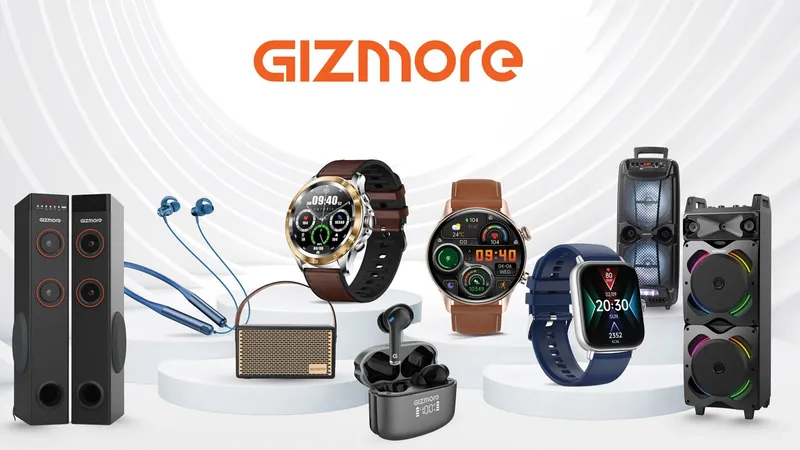This founder wants to make wearables accessible to everyone with Gizmore
Founded in 2018, Delhi-based wearable and audio brand Gizmore has established a strong distribution network and now plans to scale up.
Sanjay Kalirona started his career as a junior sales executive at the electronics company Intex. Promoted from one role to another, he eventually handled and grew the mobile vertical of the business.
An MBA degree-holder from the Fortune Institute of International Business (FIIB) Delhi, he went on to work with other affordable smartphone companies like Zen and Comio.
With around 20 years of experience in the IT industry and having worked on building brands from scratch, Sanjay decided to start something of his own. “I approach whatever I do with a sense of ownership. I don’t do it just as a job... I enjoy building businesses,” he says.
In 2018, confident about his experience in product development, branding, and distribution, he launched Gizmore, a smart accessory, fitness gear, and audio brand that aims to offer premium goods at competitive prices.
Delhi-based , which stands for ‘gadgets and more’, offers product categories such as smartwatches, neckbands, headphones, speakers, and other IT accessories like USB cables, keyboards, and power banks.
The company’s sales stood at Rs 13 crore during the first year of operations and Rs 43 crore in the next. Gizmore was started with an initial investment of Rs 4 crore.

Gizmore Products
Making a mark
India is a growing market for wearables. According to International Data Corporation (IDC), the wearable market in the country grew 56.4% year-on-year in the third quarter of 2022.
The report, published in November 2022, also showed that the sales of smartwatches increased by a whopping 178% YoY. boAt held a 32.1% share of the wearable market, while other leading brands included Noise, Fire Boltt, One Plus, and Realme.
Gizmore is focusing on three factors to establish itself in this expanding market. The first is honest pricing, and Sanjay says the company sells items at around 20% lesser price than other big players in the market “without compromising on features”.
The smart accessories and audio brand provides prompt after-sales service to build trust among its customers.
Gizmore has over 200+ service centers in different parts of the country, through which it provides repair and replacement.
For non-repairable products, replacement is done within seven to ten days.
The founder says the last differentiator is constant innovation to be the first to introduce unique concepts to the market.
In December 2022, Gizmore tied up with Tres Care, an AI-based health-tracking solution, to develop an app ecosystem for its smartwatches. With the Tres Connect app, it hopes to improve consumers' smartwatch experiences and provide detailed information about their health and fitness.
It gives a QR code printed on the packaging of its products, where customers can give direct feedback and engage with the brand better.
Business journey
The founder says the goal was to establish the brand steadily.
From 2018 to 2022, Gizmore worked to establish a pan-India distribution and service network. Today, the brand has a network of more than 200 distributors and has a presence in 15,000 retail stores across the country. In addition to this, it also sells through large retail chains like Reliance.
“We put in around four years for the groundwork and are now scaling up,” he says.
Gizmore began selling online through Flipkart and Amazon in May 2022. Smartwatches are the brand’s highest-selling category. The company sold over 40,000 smartwatches during the Diwali season, with Flipkart accounting for 70% of those sales.
In September 2022, it started its own website to sell directly to customers. Sanjay says that the ratio of offline to online sales has increased from 90:10 to 60:40 and is expected to rise.
For manufacturing, the brand collaborates with different Indian original equipment manufacturers (OEMs) and original design manufacturers (ODMs), depending on the product category. R&D and product development happen internally.
Initially, Gizmore used to import products but costs were high. It started by manufacturing speakers and then went on to make neckbands, earphones, earbuds, and smartwatches. Today, 90% of Gizmore’s products are made in India. It employs around 100 people.
What next?
Apart from expanding to every state, the company is now eyeing international growth. It is already exporting to Nepal and plans to export to Bangladesh and Dubai next.
“Being bootstrapped is both an opportunity and a challenge,” Sanjay says. While the company is growing even at a good pace, the industry is growing at a much higher rate. It becomes a challenge while competing with brands having big investments.
The company might look at funding next year to be in league with other brands and execute its expansion plans. “Our revenue reached Rs 56 crore in FY22, and we are targeting annual growth of 30-40% this year,” the founder says.
Edited by Teja Lele







